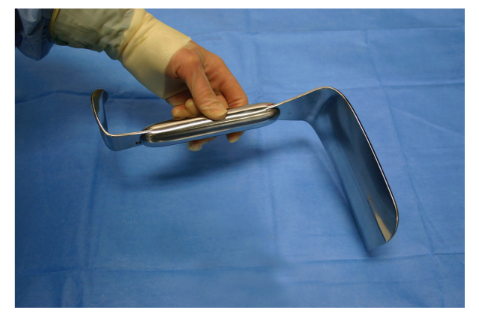Surgical Tech Instruments
1/127
Earn XP
Description and Tags
128 Instruments: General Surgery instruments listed by category and function. Scissors # 1–18 • Needle Holders # 19–27 • Forceps # 28–70 • Retractors # 71–115 • Other # 116–128
Name | Mastery | Learn | Test | Matching | Spaced | Call with Kai |
|---|
No analytics yet
Send a link to your students to track their progress
128 Terms
Roger Angular Wire scissors
Nickname: Wire cutters or scissors
Use: cut small gauge wire. Keep on patient for post operative oral emergencies.
Use In Procedures: Sternotomy in thoracic, K wires in orthopedics, arch bars in oral/max and needle localization in general surgery.
Features: Notch in instrument jaw for wire
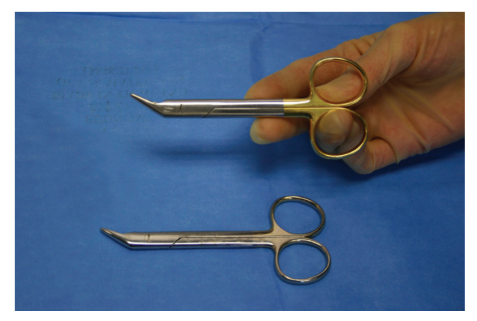
Knowles Bandage Scissors
Nickname: Bandage Scissors
Use: Removes dressing
Features: Rounded guard at working end to prevent injury to skin
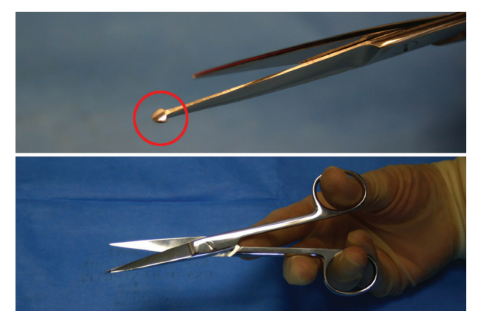
Lister Bandage Scissors
Nickname: Big Bandage Scissors
Use: Cut thick Dressing
Features: larger size for general purposes and with guard end
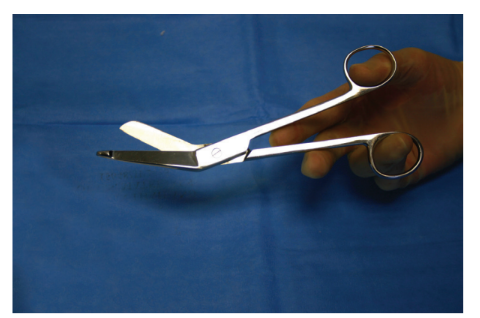
Universal Shears
Nickname: Utility scissors
Use: Cuts thick dressing, light wire, or orthopedic supplies
Features: Found in the OR room or in the non-sterile area
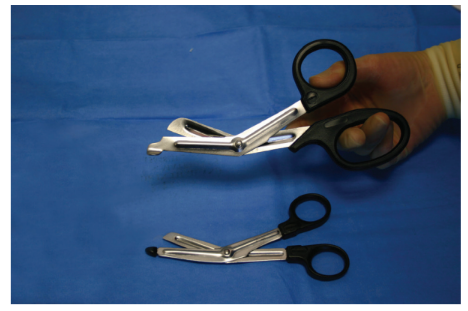
OR Scissors - Delicate , sharp-side and blunt curved
Nickname: Scissors
Use: Cuts thin tissue and dressings
Features: Dual function of blades
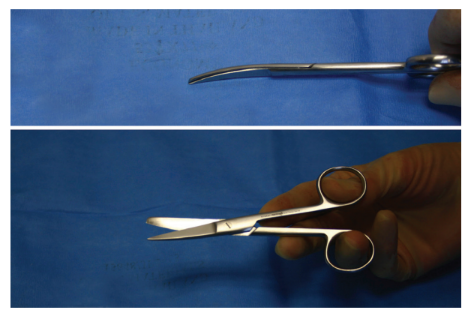
Mayo Scissors, Straight
Nickname: Mayo
Use: Cut suture or heavy tissue
Features: Tapered, blunt jaw, and available in various sizes
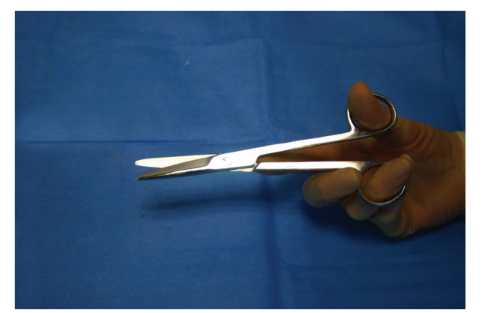
Mayo Scissors, Curved
Nickname: Curved Mayo
Use: Cuts heavy tissue, such as Fascia
Features: Most commonly used OR scissors and available in various sizes
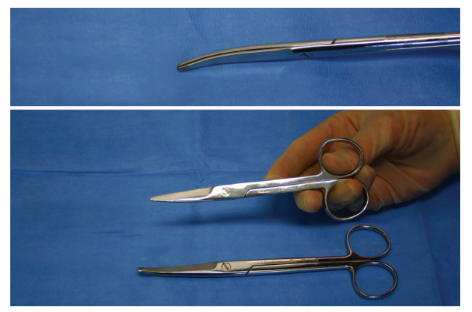
Lahey Scissors, Straight
Nickname: Suture scissors
Use: Cuts or dissects delicate tissue
Features: Tapered blunt working end, similar to Metz but shorter and finer
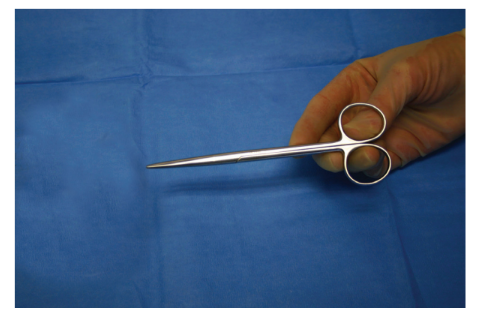
Lahey Scissors, curved
Nickname: Curved Lahey
Use: Cuts delicate tissue
Features: Finely curved jaws
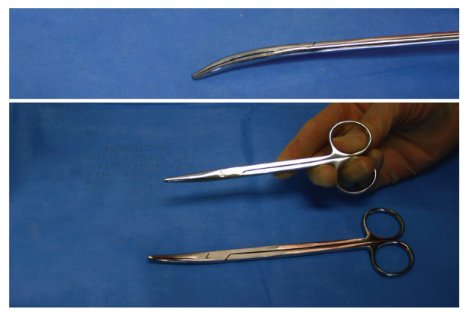
Metzenbaum Scissors, Straight
Nickname: Straight Metz, suture scissors
Use: Cuts and dissects delicate tissue or suture
Features: Used for tissue in deeper surgical planes and available in various sizes
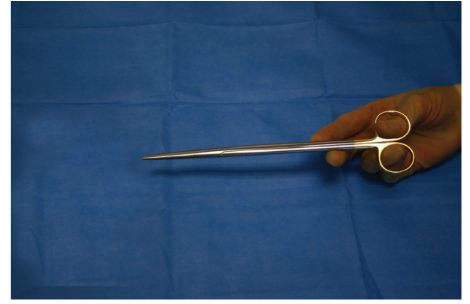
Metzenbaum Scissors, Curved
Nickname: Curved Metz, Metz, Dissecting Metz
Use: Cuts and dissects delicate tissue
Features: Finely tapered, blunt jaws
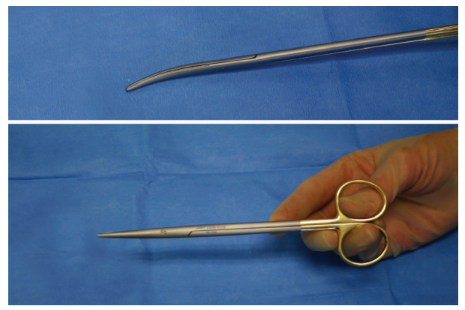
Iris Scissors, Straight
Nickname: Iris
Use: Cuts delicate tissue, fine gauge suture, and thin steri-strips
Features: Straight, sharp jaws with dual points
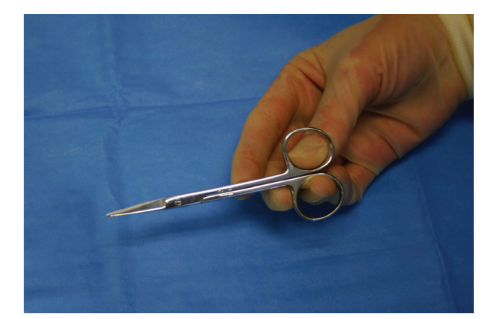
Iris Scissors, Curved
Nickname: Iris
Use: Cuts delicate tissue, fine gauge suture, and thin steri- strips
Features: Straight, sharp jaws with dual points
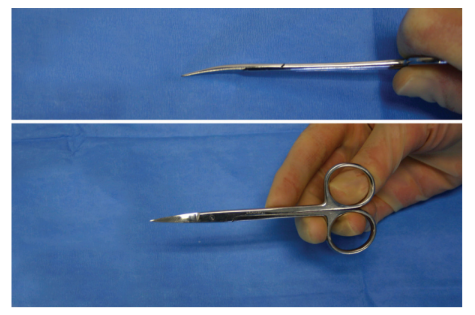
Knapp Iris Scissors
Nickname: Iris
Use: Cuts delicate tissue, supplies, and suture
Features: Tapered jaw, dual function - sharp and dull tips - can be used in carpel tunnel release or Plastics
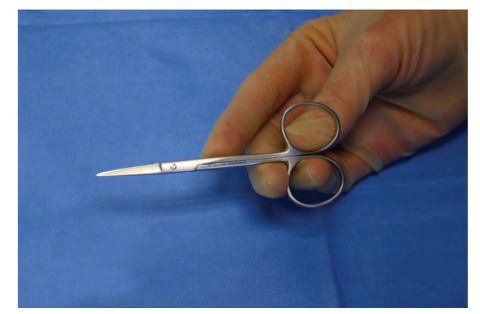
Stevens Tenotomy Scissors, Straight
Nickname: Tenotomy
Use: Cuts delicate tissue and supplies, used in general, plastics
Features: Tapered jaws, blunt tips
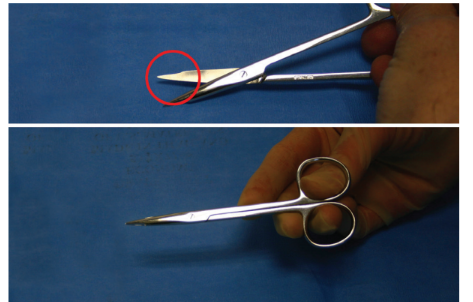
Steven Tenotomy Scissors, Curved
Nickname: Tenotomy
Use: Cuts and dissects delicate tissue, used in general, plastics, and Opthalmology
Features: Tapered jaws, blunt tips
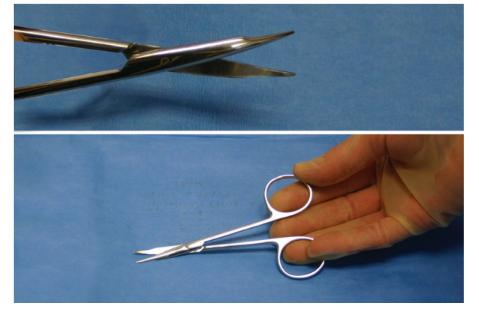
Joseph Scissors, Straight
Nickname: Joseph
Use: Cut delicate tissue, and supplies
Features: Tapered jaw, and sharp and pointed tips
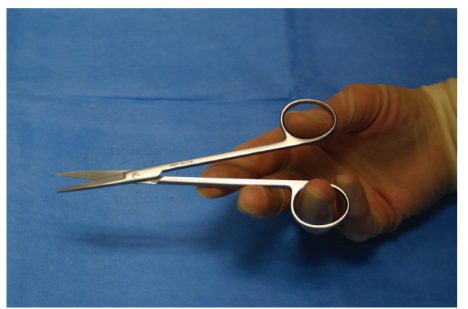
Joseph Scissors, Curved
Nickname: Long Iris, Metz, Curved Joseph
Use: Cuts delicate tissue, precisely
Features: Tapered jaws, sharp tips
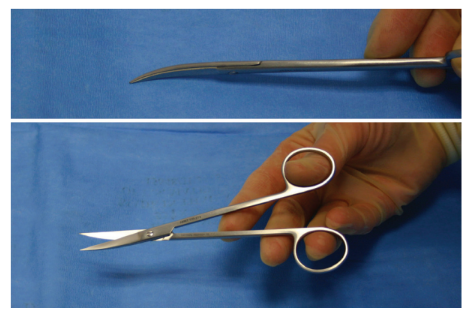
Brown Plastics Needle Holder (NH)
Nickname: Needle Holder
Use: Holds small suture needles and works in tight places
Features: Tapered, short, and heavy jaws with cross serrations
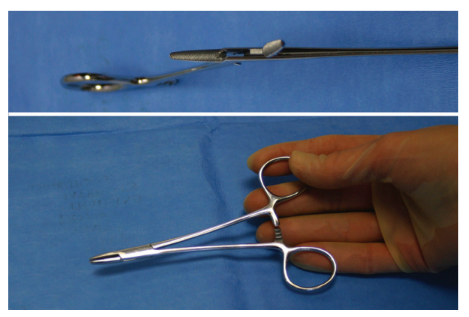
Webster NH
Nickname: Needle Holder
Use: Holds small needles
Features: Tapered, smooth, shorts and lights jaws, available with cross serrations
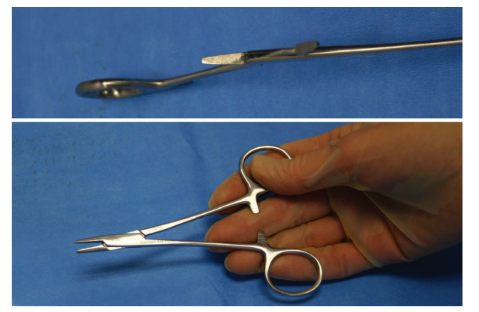
Crile Wood NH
Nickname: Needle Holder
Use: Holds standard size needles, passes through most tissue
Features: Tapered, light, serrated jaws
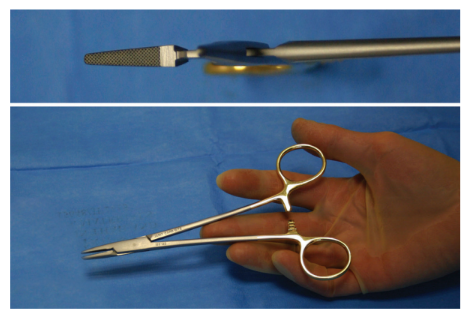
Mayo Heagar NH
Nickname: Large NH
Use: Holds large needles for thick, dense tissue
Features: Heavy, tapered, cross serrated with fenestrated window - jaws
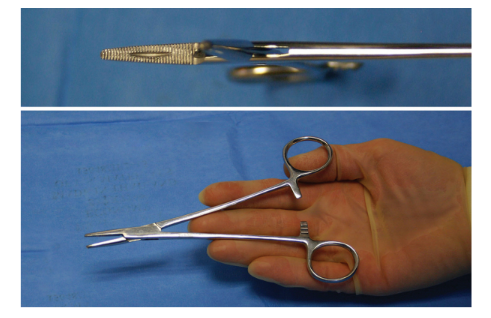
Ryder NH
Nickname: Vascular NH
Use: Holds fine and CV needles, used for grafts
Features: Short, wide - to - narrow with cross serrations
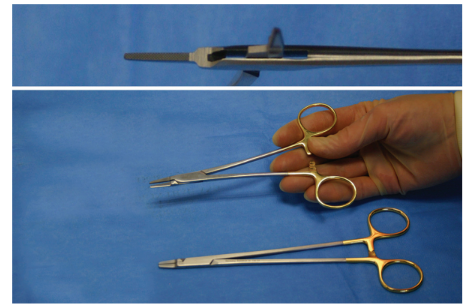
Sarot NH
Nickname: Sarot NH
Use: Holds fine, Cv suture needles
Features: Fine, tapered jaws with cross serrations, shank with minior, medial bend
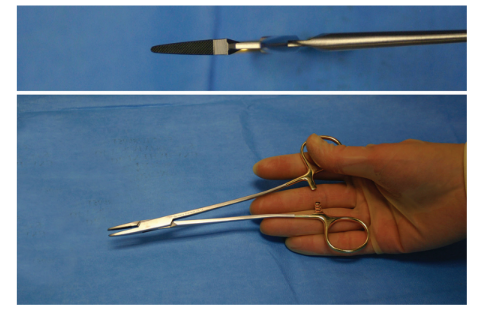
Barry Sternal NH
Nickname: Sternal NH
Use: Holds thoracic procedures, Passes heavy stainless steel wires into sternum
Features: Very heavy, oblong jaws with cross serrations
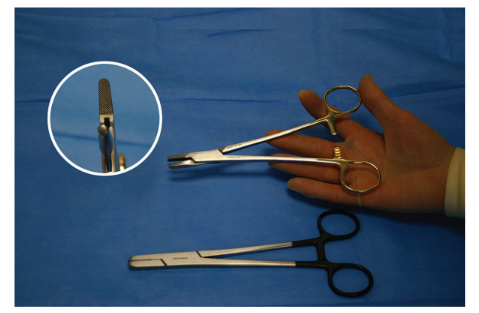
Halsey NH
Nickname: NH
Use: Holds small to medium needles, for most tissue
Features: Short, tapered with cross serrated jaws
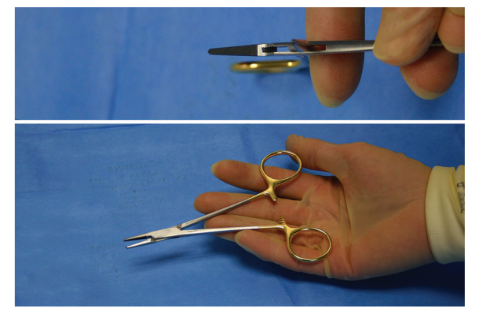
Baumgartner NH
Nickname: NH
Use: Grasps small to medium suture needles
Features: Short, tapered with cross serrated medium jaws
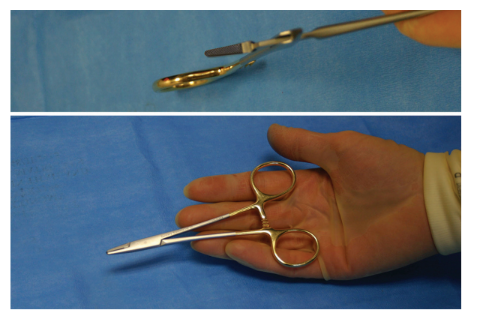
Adson Dressing Forceps
Nickname: Adson Pick Up
Use: Grasps steri strips or skin during skin closure
Features: Wide serrated handle, thin jaws with serrated tips
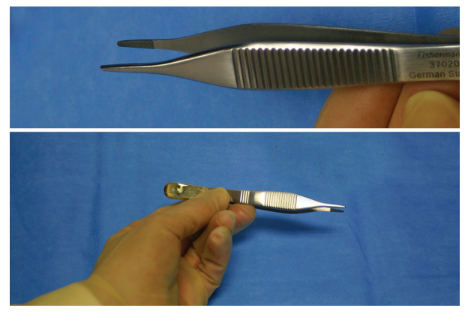
Thumb Forceps
Nickname: Smooth pickups, dressing forceps
Use: Grasps delicate tissue
Features: Fluted handle, tapered, serrated jaws
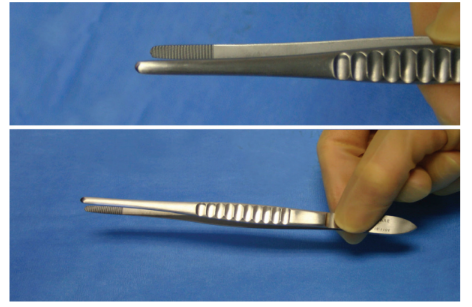
Crushing Forceps
Nickname: Cushings, pickups
Use: Grasps tissue or sponge in deeper planes
Features: Fluted handle, Thins serrations, tapered jaws, cross pin for stability
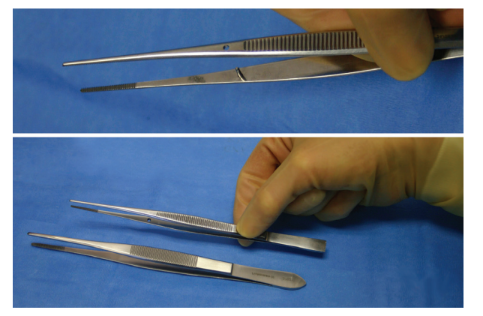
Janson Bayonet Forceps
Nickname: Bayonet pick ups
Use: Grasps medium tissue, neuro patty sponges, and gel foam squares
Features: Serrated handle, fine, tapered serrated tips, bayonet shape improves visualization
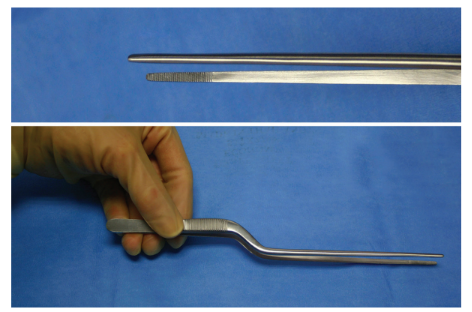
Lucae Bayonet Forceps
Nickname: Short Bayonets
Use: Grasps thin tissue, sponges, neuro patties, and used in ENT procedures
Features: Serrated handle, finely tapered serrated tips, bayonet shape improves visualization
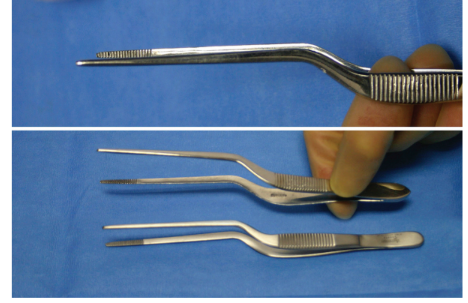
Geralds Forceps
Nickname: Gerald dressing forceps
Use: Grasps delicate tissue, vascular procedures
Features: Serrated handle, fine, tapered cross serrated jaws, teeth at tips, cross pin
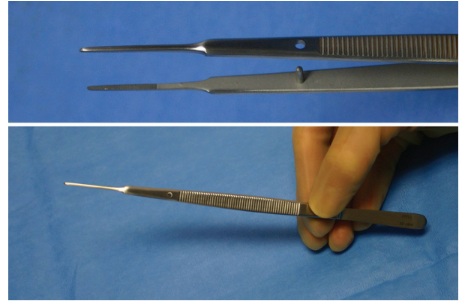
Adson Tissue Forceps
Nickname: Adson’s with teeth or toothed Adsons
Use: St passes with skin suture in general and plastic procedures
Features: Side serrated handle, thin jaw with 1X2 teeth - one on superior and two on inferior
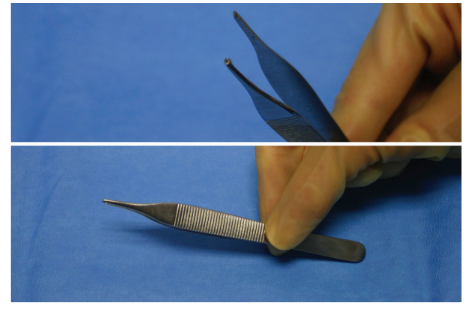
Brown - Adosn Tissue Forceps
Nickname: Adson Brown’s
Use: Grasps delicate tissue
Features: Wide serrated handle, jaws in two rows with 7×7 fine teeth, used in Plastics and Podiatry
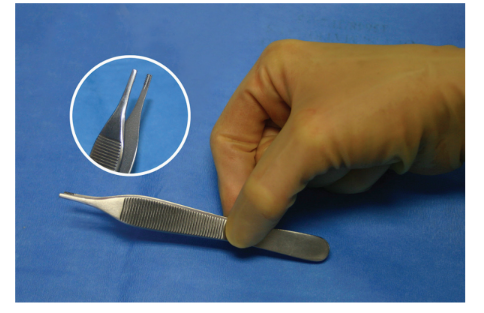
Debakey Tissue Forceps
Nickname: Debakeys
Use: Grasps most tissue, very frequently used in OR, General, CT, and Vascular procedures
Features: Fluted handle, 1×2 rows of micro teeth on fine tapered, blunt tip jaws
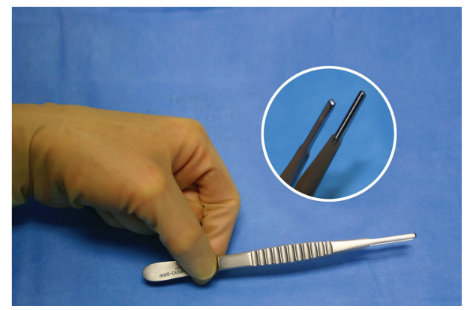
Russian Tissue Forceps
Nickname: Russians
Use: Grasps most tissue, atraumatic, powerful grip for GYN and peritoneum
Features: Fluted handle, cupped, fanlike serrations at tips
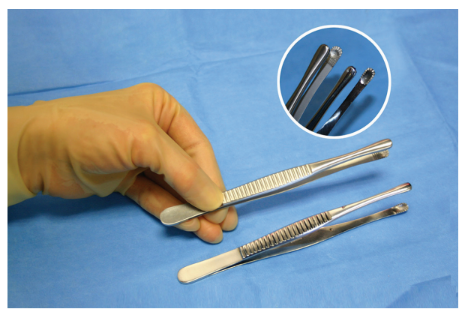
Potts-Smith Tissue Forceps
Nickname: Potts pick up
Use: Grasps small, deep tissue, ENT
Features: Serrated handle, fine tapered jaws, 1×2 fine teeth, and cross pin.
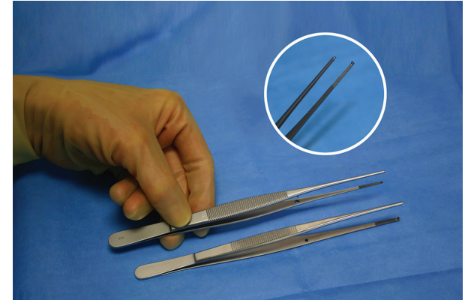
Gerald Tissue Forceps, Straight
Nickname: Gerald’s
Use: Grasps deep, delicate tissue, cross - pin maintains alignment during use
Features: Serrated handles, thin, pointed ends with 1×2 teeth curved jaw option
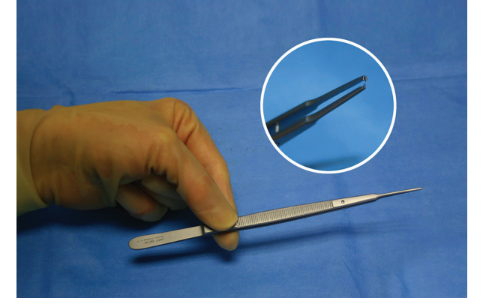
Selman Tissue Forceps
Nickname: Thin Russians
Use: Provides firm grasp for lighter tissue
Features: Serrated handles, atraumatic, cupped fanlike serrations at teeth
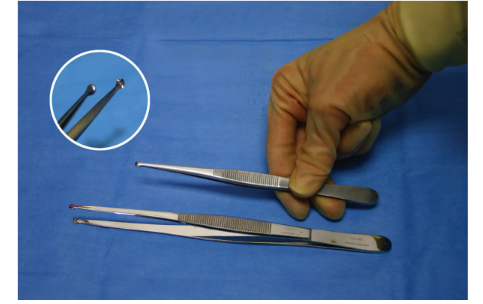
Semkin Thumb Tissue Forceps
Nickname: Pick ups, fine thumb, small Pott’s, Semkins
Use: Grasps delicate, thin tissue
Features: Serrated handles, cross pin, thin, pointed ends with 1×2 fine teeth
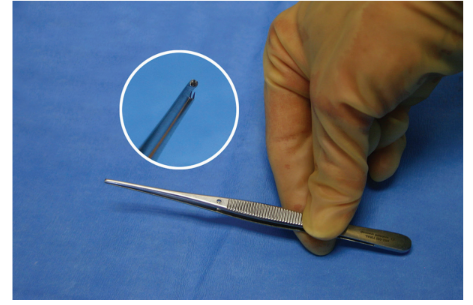
Thumb Tissue Forceps
Nickname: Mouse tooth, toothed pickups, thumb pickups, pickups with teeth
Use: Grasps and approximates tissue for skin suturing
Features: Serrated handle with 1×2 small teeth
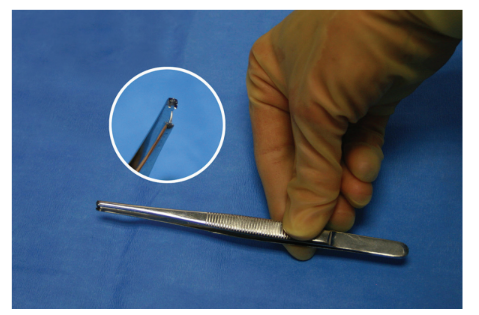
Tuttle Tissue Forceps
Nickname: Ring forceps, tuttle’s, singley’s, tuttle thoracic
Use: Atraumatic; grasps lung tissue
Features: Fenestrated jaws and serrations, cross pin variation modeled
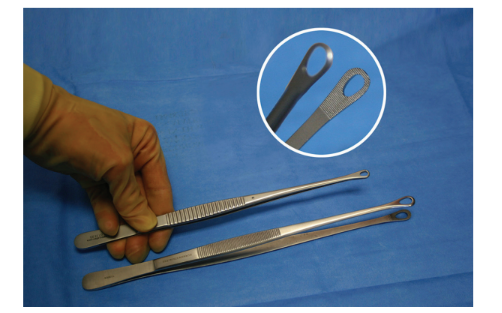
Singley Tissue Forceps
Nickname: Singley’s, ring pickups
Use: Grasps tissue
Features: Serrated handle, heavy, serrated, fenestrated tip, cross pin variation
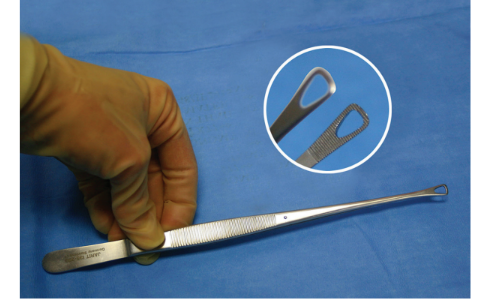
Bonney Forceps
Nickname: Bonney’s extra heavy
Use: Grasps heavy tissue, muscle, cartilage, used in orthopedics and GYN
Features: Pyramid handle, serrated tip, 1×2 or 2×3 rat teeth
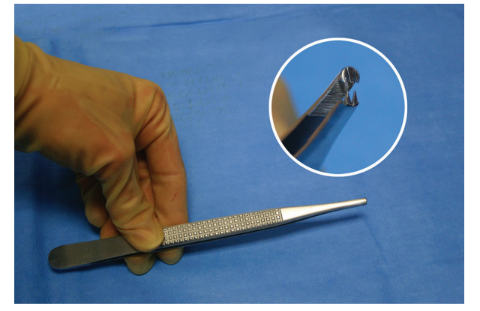
Ferris-Smith Forceps
Nickname: Wide Bonney’s
Use: Grasps heavy tissue, muscle, cartilage, used in orthopedics and GYN
Features: Extra wide, oval pyramid handle, tapered tip with cross serrations, 1×2 rat teeth
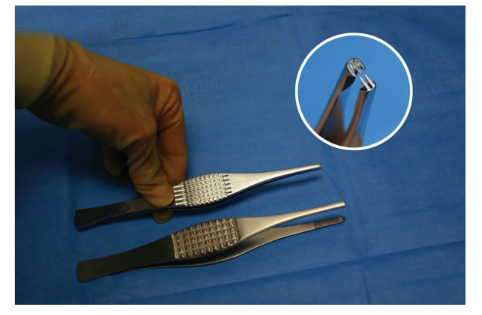
Brown Forceps
Nickname: Brown’s
Use: Grasps and approximates delicate, medium tissue
Features: Serrated handle, tapered tip with 2 rows 9×9 mini teeth
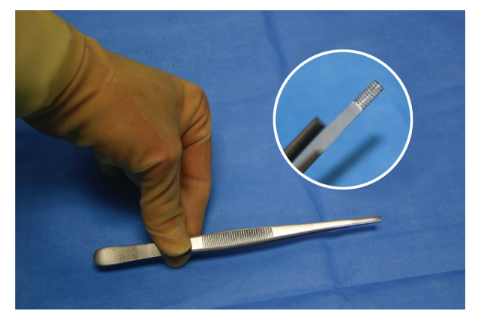
Cushing Bayonet Forceps
Nickname: Cushing Bayonet
Use: grasps light medium tissue, neuro, and ENT
Features: Serrated handle, downward slope with fine 1×2 mini teeth, cross pin and allows visualization of surgical site
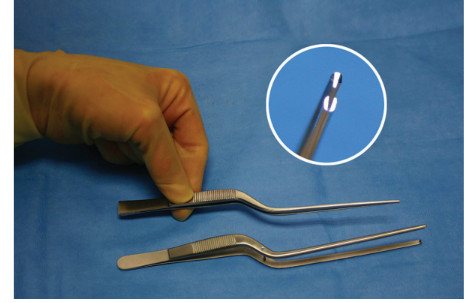
Lucae Tissue Forceps
Nickname: Bayonet with teeth, Lucae
Use: Grasps light to medium tissue, CV and ENT
Features: Serrated handle, upward slope, fine 1×2 mouse teeth. variation with cross pin.
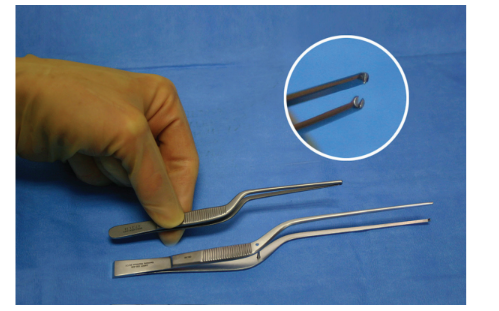
Allis Tissue Forceps
Nickname: Allis
Use: Grasps tissue and ratchet hold, used in General and Specialties
Features: Wide, flat jaw with 4×5 teeth, variations available
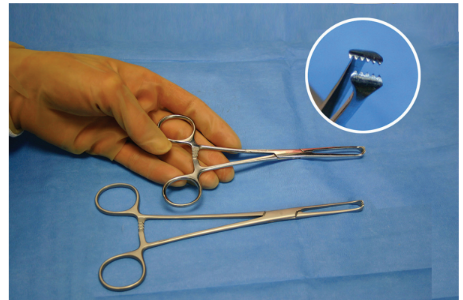
Adair Allis Tissue Forceps
Nickname: Wide Allis
Use: Grasps tougher tissue
Features: Wide, flat jaw with 9×10 mini teeth
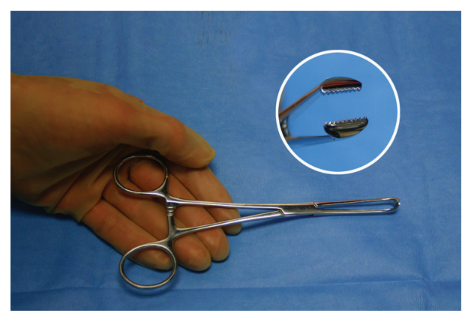
Babcock Tissue Forceps
Nickname: Babcock
Use: Grasps most General Surgery tissue, bowel and GYN tubes
Features: Wide, flat jaw, fenestrated, serrations or groves along tip, atraumatic
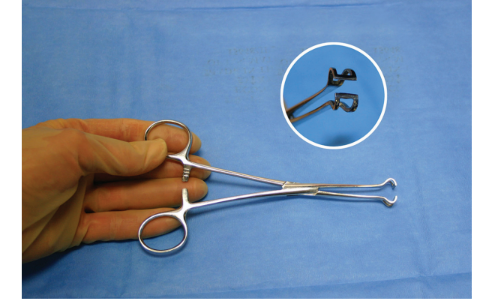
Halstead Mosquito Hemostat, Straight
Nickname: straight mosquito
Use: Grasps a lap sponge, or light tissue and vessels
Features: Serrated tip, in various lengths
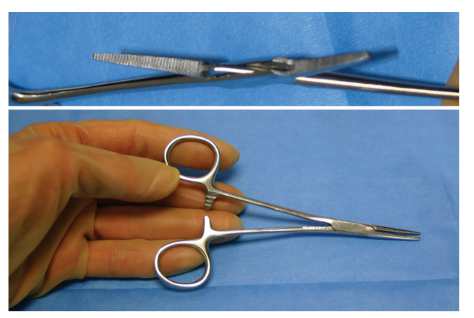
Halstead Mosquito Hemostat, Curved
Nickname: Curved mosquito or curved hemostat
Use: Grasps light tissue, small vessels, use with the surgical pattern- clamp-clamp-cut-tie in General and PV
Features: Curved tip with serrations, various lengths
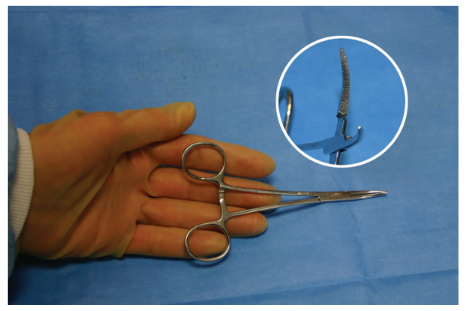
Crile Hemostat, Straight
Nickname: Crile, Hemostat
Use: Grasps light to medium tissue, vessels, and suture and found in most instruments sets
Features: Tip with serrations, various lengths
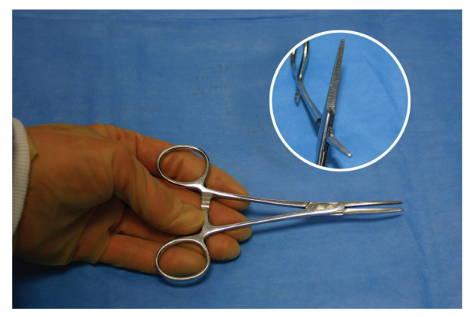
Crile Hemostat, Curved
Nickname: Crile, snap, hemostat
Use: Grasps light to medium tissue, vessels, and suture and found in most instruments sets
Features: Curved tip with serrations. Use with the surgical pattern- clamp-clamp-cut-tie.
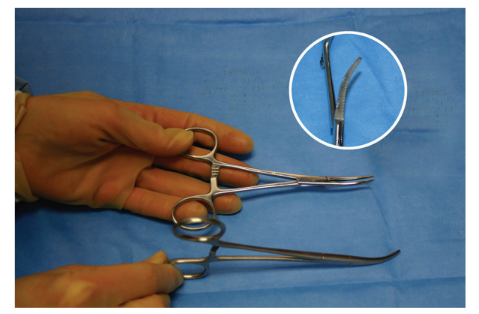
Kelly Hemostat, Straight
Nickname: Kelly
Use: Grasps medium tissue, clamps vessels in General and GYN surgery
Features: Tapered jaw with 2/3 serrations, various lengths
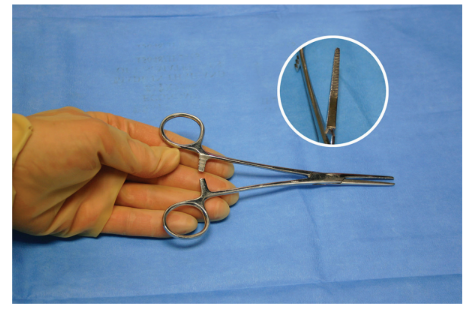
Kelly Hemostat, Curved
Nickname: Kelly
Use: Grasps medium tissue, clamps vessels, and used in pattern- clamp-clamp-cut-tie.
Features: Various size, use longer for deeper surgical planes, curved with 2/3 serrations.
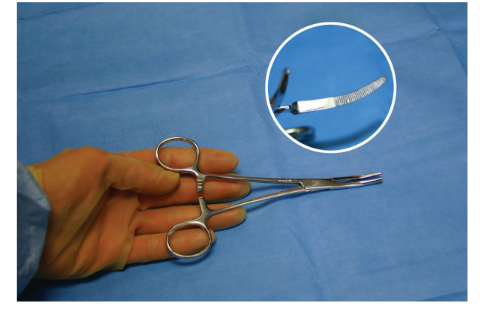
Rochester-Pean Hemostat, Straight
Nickname: Pean’s, kelly, clamp
Use: Grasps medium to heavy tissue and vessels
Features: Straight tapered tip with full length serrations
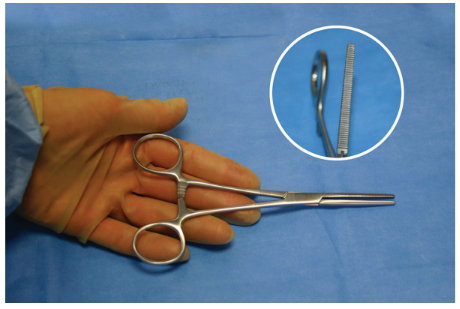
Rochester-Pean Hemostat, Curved
Nickname: Curved Kelly
Use: Grasps tissue, clamp vessels
Features: Curved, tapered tip with full length serrations
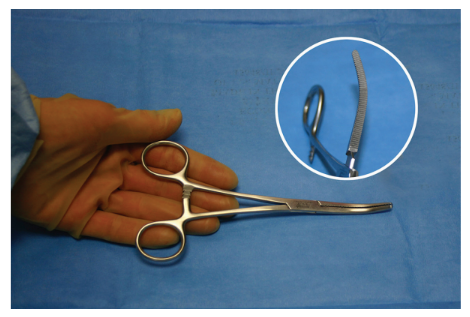
Rochester Oschner Hemostat, Straight
Nickname: Straight Kocher
Use: Grasps medium tissue, clamps vessels, found in most sets- General, Ortho, GYN, use in pattern- clamp-clamp-cut-tie.
Features: Tips with full serrations, rat tooth 1×2, variations in lengths
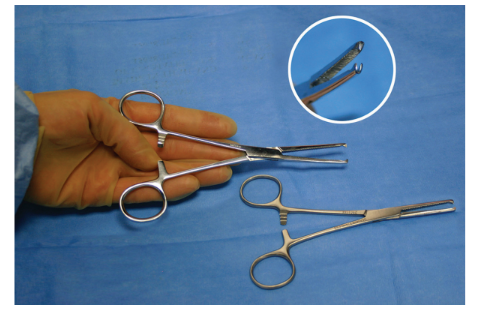
Rochester Oschner Hemostat, Curved
Nickname: Curved Kocher
Use: Grasps medium tissue, clamps vessels, found in most sets- General, Ortho, GYN
Features: Tapered full serrated jaws, rat teeth 1×2
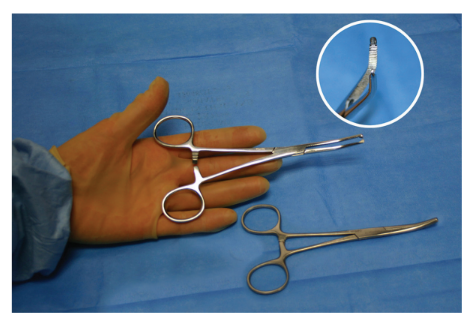
Adson Hemostat, Straight
Nickname: Straight tonsil, Adson
Use: Grasps light to medium tissue, clamps vessels, General and ENT
Features: Tapered, narrow 2/3 serrated jaws
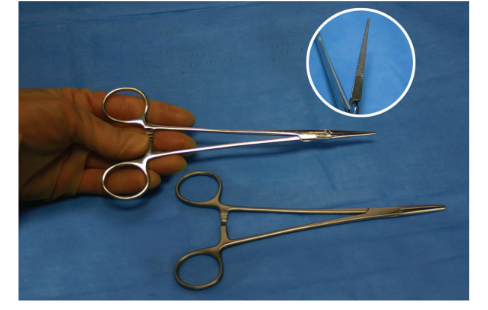
Adson Hemostat, Curved
Nickname: Curved Tonsil
Use: Grasps and clamps deeper planes, punctures skin for a drain
Features: Curved, tapered narrow 2/3 serrated jaws
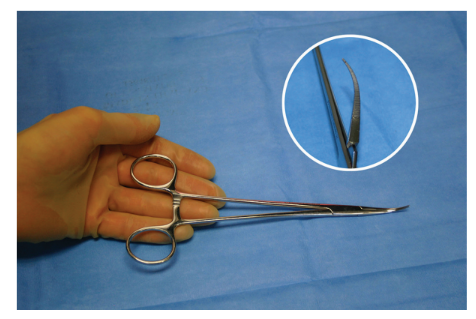
Dandy Hemostat
Nickname: Dandy
Use: Grasps and clamps tissue, used in Neuro and Orthopedics
Features: Tapered 2/3 serrated jaws, entire clamp curved, sideway orientation
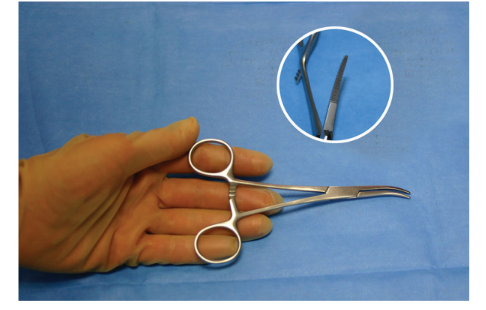
Lahey Dissecting Forceps
Nickname: Right Angles
Use: Grasps, dissects, and passes ligature ties
Features: Not a true right angle, 4×5 longitudinal serrations on 2/3 jaws
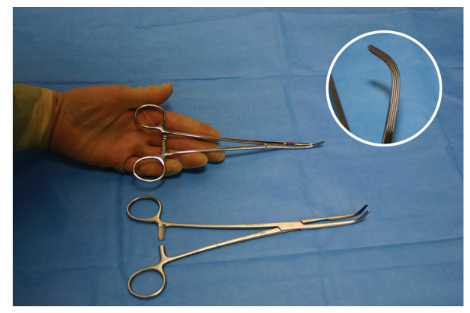
Mixter Dissecting Forceps
Nickname: Mixter
Use: Grasps, dissects, and passes tie
Features: Not a true right angle, curved jaws with serrations on ½ jaw also known as Weck pattern
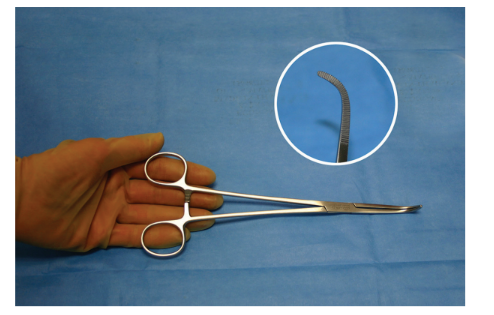
Mixter Dissecting Forceps
Nickname: Mixter
Use: Grasps, dissects and passes ties
Features: Curved, heavier jaw with serrations then entire length of jaws
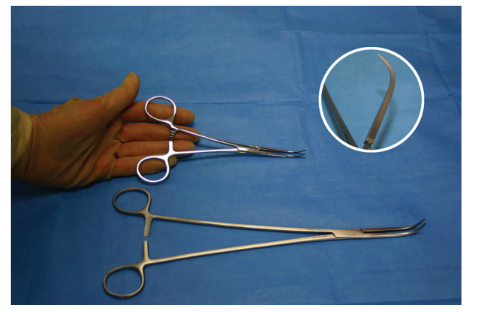
Meeker Forceps
Nickname: Right angles
Use: Grasps, dissects, and passes
Features: True right angle, curved with fully serrated jaws
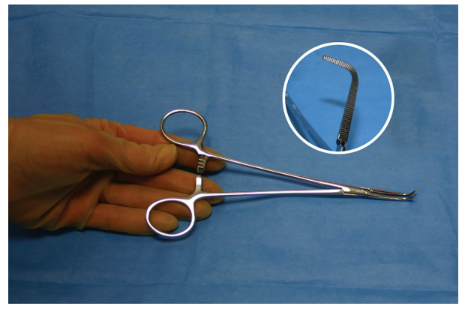
Westphal Duct Forceps
Nickname: Right angles
Use: Grasps, dissects, passes, used frequently in an open cholecystectomy
Features: Narrow, curved, 4/5 longitudinal serrations on jaws
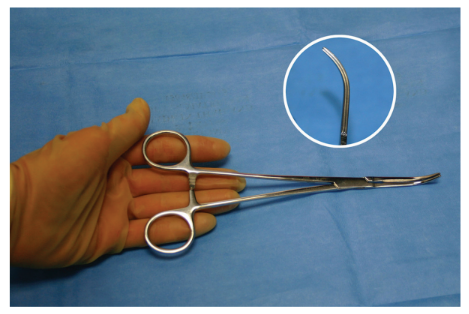
Joseph Single Skin Hook
Nickname: Skin Hook
Use: Retracts small areas
Features: Cross serrations on handle, sharp, single curved mini tips
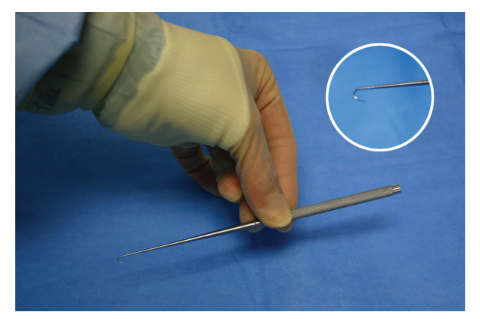
Joseph Double Skin Hook
Nickname: Double skin hook
Use: Retracts in General, Plastics, and hand procedures
Features: Cross serrations on handle, sharp, double curved mini tips
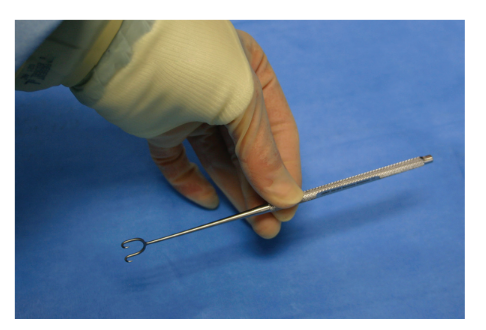
Guthrie Double Skin Hook
Nickname: Guthrie
Use: Provides very light retraction, Plastics, Ophthalmology, General, and Podiatry
Features: Smooth or fluted handle, sharp, tapered double hooks
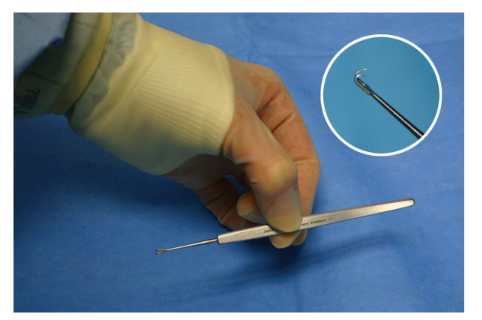
Isreal Retractor
Nickname: Israel rake
Use: Retracts heavy tissue in mid-range surgical planes, General, and Orthopedics
Features: Smooth Ankh-like handle style to promote comfort while retracting, 4-prong, curved, blunt tips
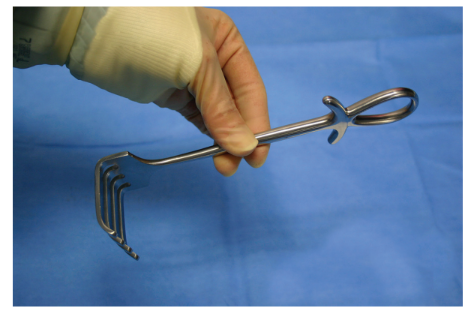
Murphy Retractor, Sharp
Nickname: Sharp Murphy
Use: retracts in General Surgery
Features: Ankh-like-handle for comfort, 3-prongs, curved, sharp tips.
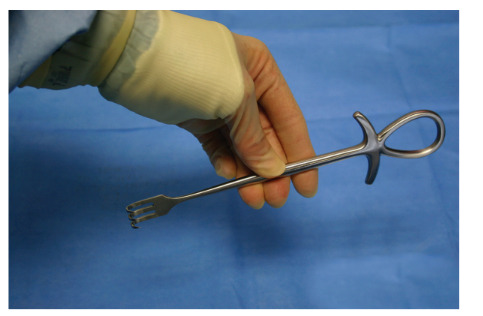
Murphy Retractor, Blunt
Nickname: Blunt Murphy
Use: Retracts in General Surgery
Features: Ankh-like handle, atraumatic, blunt tips
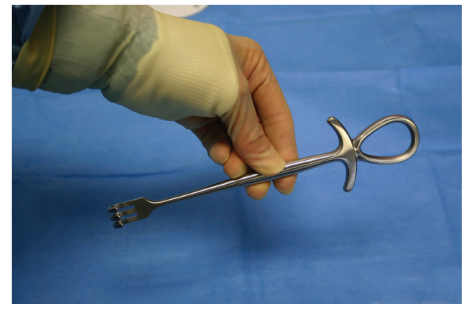
Volkmann Rake Retractor, Sharp
Nickname: Sharp rake
Use: Retraction
Features: Handle with round, finger ring and 3 prongs
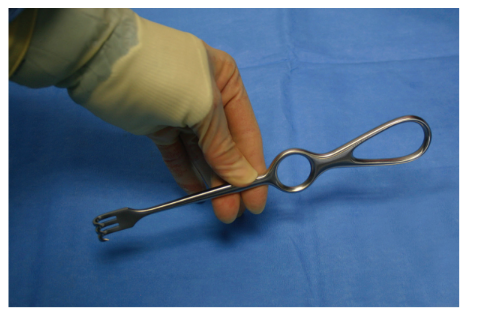
Volkmann Rake Retractor, Blunt
Nickname: Blunt Rake
Use: Retractor
Features: Handle variations, 6-prongs blunt tips
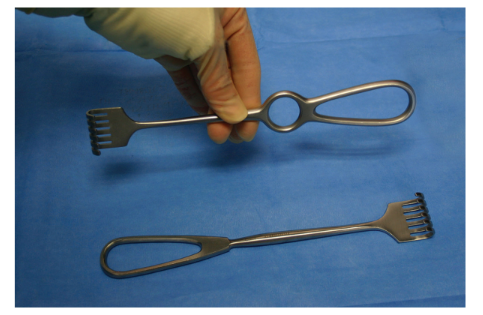
Green Retractor
Nickname: Green
Use: Atraumatic retraction of delicate tissue- ENT, General, thyroid surgery
Features: Stirrup-like open loop tip, looks like the “G” in green
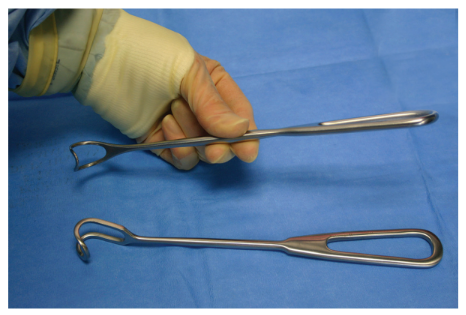
Langenbeck Retractor
Nickname: Langenbeck
Use: Atraumatic retraction, thyroid tissue, hernia, or open appendectomy procedure
Features: Smooth long handle, right-angle toe-in blade end
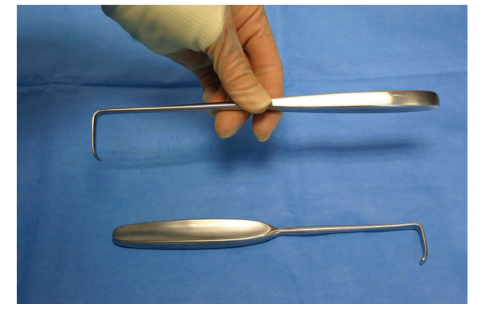
Lahey Retractor
Nickname: Baby Appendiceal
Use: Atraumatic retraction - ENT, thyroid, hernia, and open appendectomy procedures
Features: Grooved handle, right-angle, toe-in blade tip.
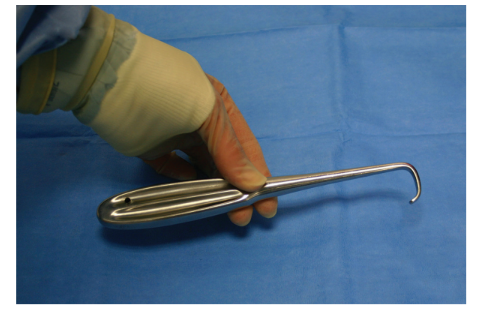
Mayo Abdominal Retractor
Nickname: Abdominal Retractor
Use: Retracts multiple layers of tissue
Features: Hollow handle, curved, rounded winged tip
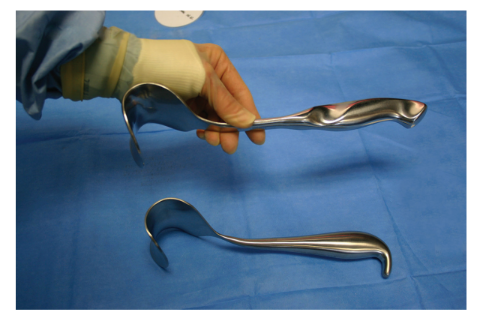
Sauerbruch Retractor
Nickname: Appendiceal, Sauerbruch
Use: Retracts multiple layers, open appendectomy, breast procedures, and GYN
Features: Blunt blade protects tissue, square, hallow, grooved handle with additional thumb rest, toe in tip, right angle
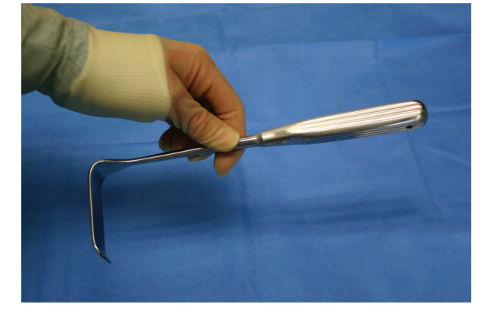
Dandy Nerve Hook
Nickname: Nerve hook
Use: Retraction of nerves
Features:Long, slender handle, blunt, atraumatic, right-angle tip
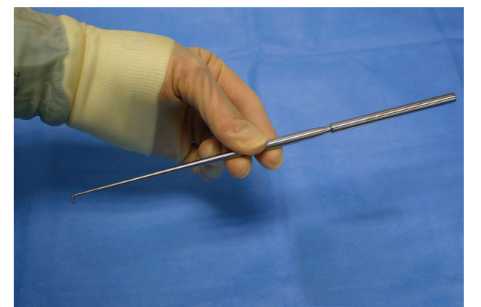
Love Nerve Retractor
Nickname: Love retractor
Use: Retraction by cradling the nerve
Features: Flat handle, blunt, flared tip, multiple end variations 45, 90, and 180 degrees
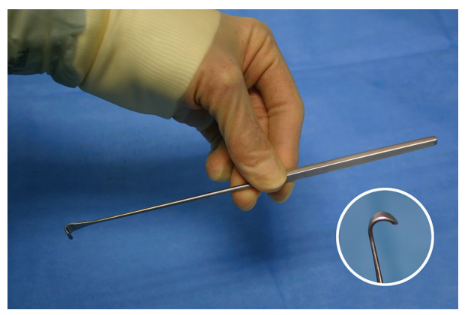
Cushing Vein Retractor
Nickname: Vein Retractor
Use: Retracts blood vessels and nerve plexuses
Features: Open handle, blunt, flared angled tip
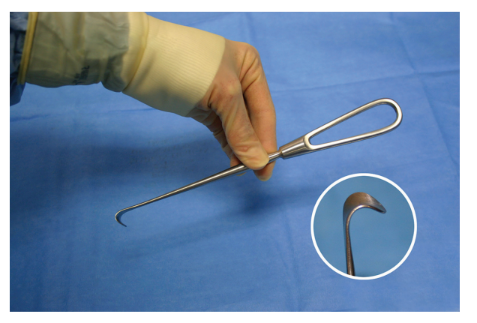
Mayo-Collins Retractor
Nickname: Double ended Mayo
Use: Retraction, usually found in pairs, provides choice of 4 blade lengths
Features: Smooth handle, double ended slotted, blunt toe in right angle tips, one end is longer than other
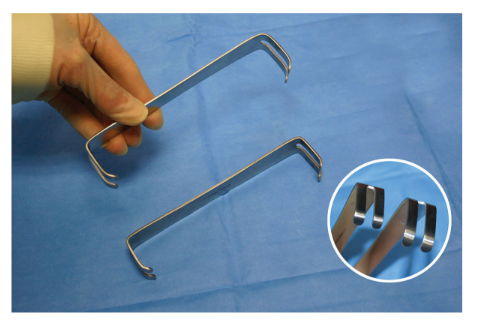
US Army Retractor
Nickname: Army Navy or Navy Army
Use: Retraction, set of two and provides four-blade lengths
Features: Fenestrated handle, double ended, right-angle toe-in, blunt rounded ends
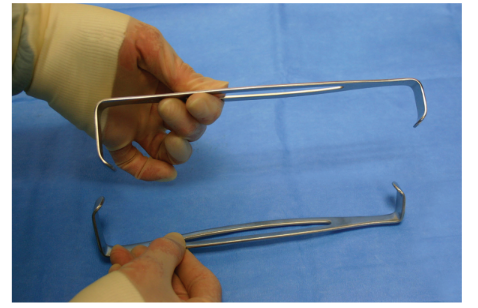
Parker Retractor
Nickname: Parker
Use: retraction, set of two and provided four-blade lengths
Features: Smooth handle, handle and blades same width, angled double ends cradle tissue.
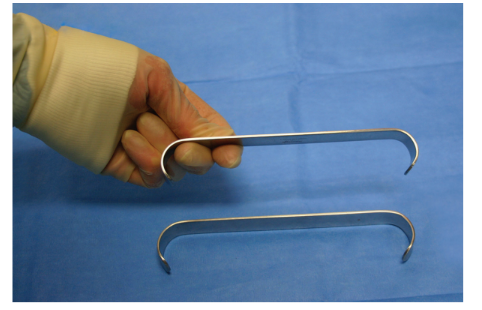
Roux Double Ended Retractor, Small
Nickname: Roux
Use: Retraction, with two blade lengths
Features: Flat shank shaft, angled bends at tips, rounded and wide
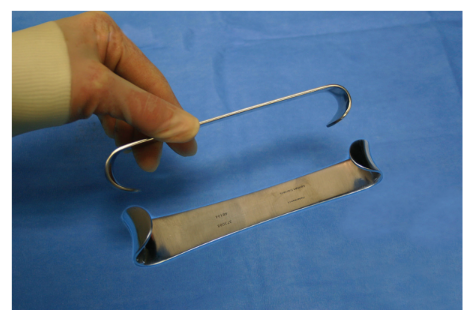
Goelet Retractor
Nickname: Goelet
Use: Retraction, used as a single retractor
Features: Shaft curves inward, wide angled blade tips
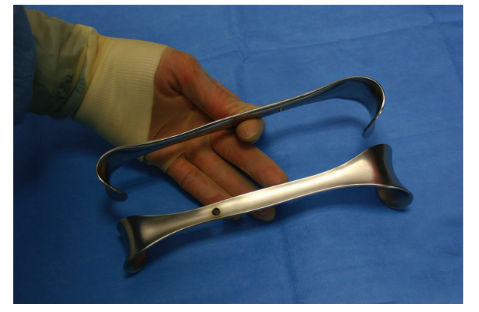
Senn Retractor, Sharp
Nickname: Senn
Use: Retracts small tissue, hernia repair, great biopsy procedures
Features: Double ended and reverse direction, 3-prong sharp rake and toe-in right angle blade.
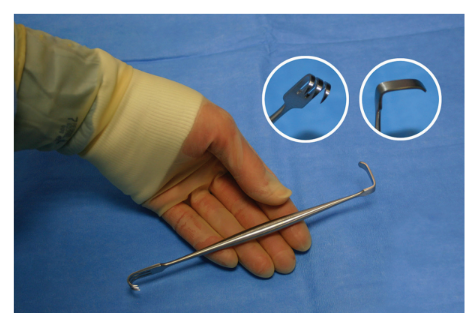
Senn Retractor, Blunt
Nickname: Blunt sense, rake side
Use: Retracts small tissue
Features: Double reversed ends, 3 prongs dull rake and toe in right angle blade
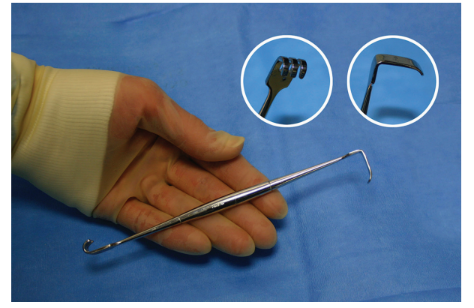
Ragnell Retractor
Nickname: Ragnell, French
Use: Retracts very small tissue
Features: Round cross serrated handle, double reversed ends, one end flat toe in blade and other with cradled tip
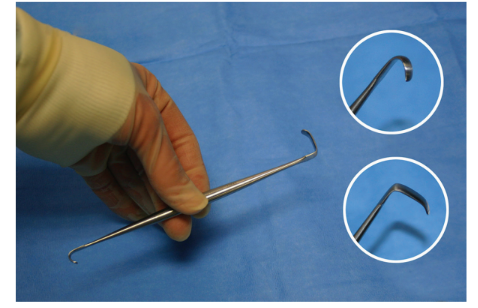
Deaver Retractor
Nickname: Deaver, shown holding the working end as if passing to the surgeon
Use: Retracts deeper surgical planes, holds moistened lap sponges against tissue
Features: Flat, thin handle with end crafted to cradle the hand, variations available-hollow, lamb, and grip
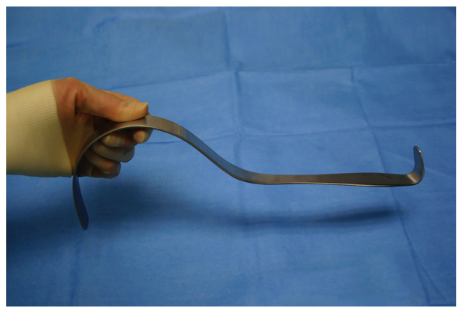
Deaver Retractor
Nickname: Deaver
Use: Retracts deep tissue, shown holding the working end as if to the surgeon
Features: Lamb handle with palm rest curved in same direction as the working end-blade. Various lengths, width, and handles.
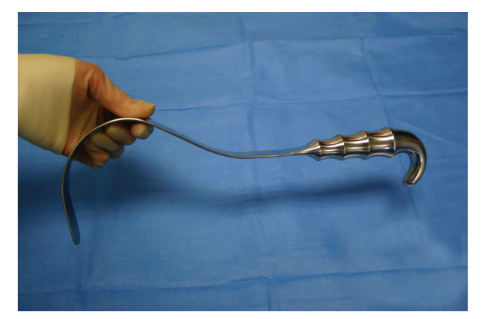
Debakey-Cooley-Harrington Retractor
Nickname: Harrington, DCH, transplant dealer
Use: Retracts deep tissue
Features: Thin, flat shank, lamb handle, heart-shaped serrated tip without protective piping
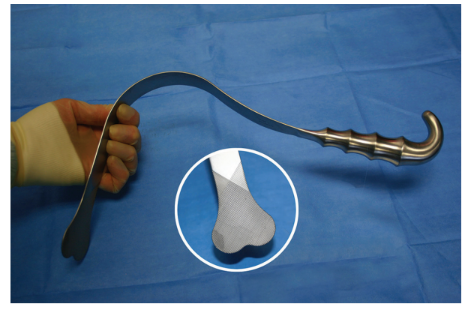
Debakey- Cooley Retractor
Nickname: XL Deaver
Use: Retraction in deep planes, intestines, bowel and transplants
Features: Wide, thin, flat blunt blade, lamb or hollow grip
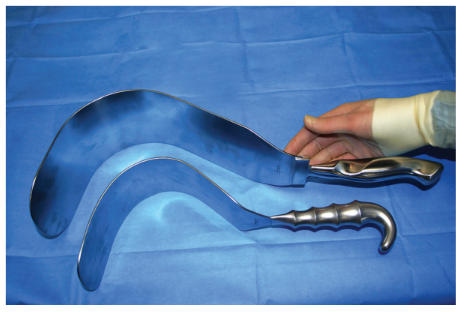
Harrington Retractor
Nickname: Sweetheart
Use: Retraction of deeper tissue. Shown holding working end and as if passing to the surgeon.
Features: Smooth heart-shaped working end with protective raised piping
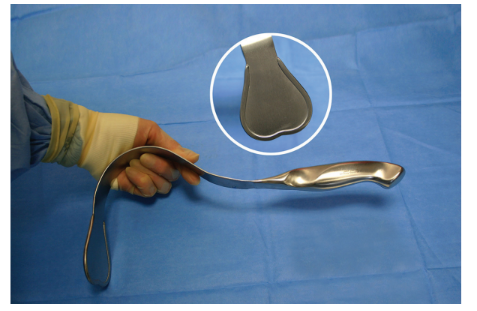
Weinberg Vagotomy Retractor
Nickname: Joe’s Hoe, Vagotomy Retractor
Use: Retracts deep intestinal tissue
Features: Very heavy, smooth, oblong handle with reversed right angle double-ended toe in, blunt tips. Weights approximately 2 pounds or 8 times more than most retractors
